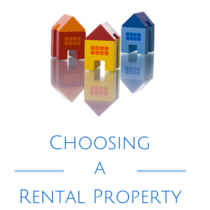Choosing a Rental Property

Making the decision that you want to be a landlord is one thing, but it’s something completely different to find your perfect property and turn it into a successful let or resale. Even if you’ve narrowed down your search to a particular area or town, you might still be some way from finding the right property for you.
Unfortunately, there’s no one-size fits all policy for picking the right property, as every property will have its pros and cons. It’s also pretty likely that if there was a perfect property out there it would have already been snapped up by someone else! So, how should you go about finding the right property, and what considerations should you be making as you flick through those agents’ brochures?
Know When to Say No
For all landlords some things should start the alarm bells ringing straight away, and knowing when a property simply isn’t suitable is the first mark of a good landlord. Significant structural work will be an immediate turn-off to anyone with no experience in development, and cheap properties which have suffered from flooding or subsidence in recent years are usually not worth salvaging.
Equally, you should be concerned when buying a property from another landlord. The two main reasons for selling a property are that it’s either reached the peak of the market and it’s time to cash in, or it’s time to cut your losses because you’re not attracting any tenants. Be very careful with these kinds of properties as they could land you in financial trouble.
Choosing Your Property
If you’ve been following the landlord industry for some time you’ll probably be well aware that there are big bucks in renovations, transformations and HMO conversions. However, if you are going to make money from these sorts of properties then you need to be competent at arranging the project.
The right property for you is not necessarily the one which will make every other investor turn their heads, nor does it have to be a candidate for the next series of Grand Designs. You need to be able to tap into your skills, whether as a landlord, builder, surveyor or project manager, and make sure you choose properties which allow you to use your skills.
Back-Up Strategies
After a few viewings you’ll no doubt have a good idea of what can be done to a property, and you’ll start to get a feel for the potential it has. It’s absolutely right to go in with a vision and, as a landlord, knowing the best way to use a property is what sets you apart from the rest of the market.
However, one idea may simply not be enough and it’s prudent to have a back-up plan if your first strategy goes wrong. Normally, renovations can simply target the rental market and still have the sales market available if all goes wrong, but having a feasible business plan for a second strategy is a must before parting with your cash.
The Right Property at the Right Price
Choosing the right property is, actually, all about finding good value for money. What looks dubious at £200,000 might seem to be a bargain at £150,000. Price negotiations can often be the difference between a loss and a profit, so don’t underestimate the power of bargaining.
You should set yourself a limit on any property and never be afraid to offer significantly below the asking price. Paying any higher than you think you could make a profit on makes even the right property the wrong property: if the price is no good, walk away and move on.
Landlords and Personal Taste
Most landlords battle with personal taste on a daily basis, and the fact is that your tastes might not necessarily be in agreement with the market. This is as true for décor and finishing touches as it is for properties, so never go in on a property because you personally love it. It’s all about marketability.
There is one exception to this rule and it comes from landlords who are seeking ‘nest-eggs’ or retirement properties that they intend to let for a short time. Here you need to prioritise capital growth over any immediate income shortfalls and make sure you have something that you could at least see yourself living in in the future.
Now you have the know-how, the only thing you need to do is research! It’s only by getting familiar with each property that you’re interested in that you’ll be able to definitively say if it’s a good or bad buy for you.


